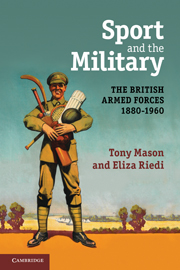Book contents
- Frontmatter
- Contents
- List of illustrations
- Acknowledgements
- Introduction
- 1 The growth of service sport, 1880–1914
- 2 Officer sports and their critics, 1880–1914
- 3 Sport in the Great War
- 4 The amateur era, 1919–39
- 5 Soldiers, sailors and civilians
- 6 A different kind of war
- 7 The national service years: the summit of military sport?
- Conclusion
- Select bibliography
- Index
6 - A different kind of war
Published online by Cambridge University Press: 05 December 2012
- Frontmatter
- Contents
- List of illustrations
- Acknowledgements
- Introduction
- 1 The growth of service sport, 1880–1914
- 2 Officer sports and their critics, 1880–1914
- 3 Sport in the Great War
- 4 The amateur era, 1919–39
- 5 Soldiers, sailors and civilians
- 6 A different kind of war
- 7 The national service years: the summit of military sport?
- Conclusion
- Select bibliography
- Index
Summary
Some of you chaps who had a rough time during the war may consider that because we were footballers we had a much better time. So we did, and I should be the last man to deny it.
Ron Burgess, Football – My Life (London: Souvenir Press, 1952), p. 62Recently a number of historians have emphasised that from the point of view of the fighting man there were at times striking similarities between the Second and First World Wars. Trench warfare and ‘shellshock’ were not confined to the Great War; the experience of combat was often equally traumatic; and at times (especially in Normandy) casualty rates equalled or even exceeded those of the Western Front. Yet these similarities should not perhaps be overstated. One significant difference in the Second World War was the concentration of hundreds of thousands of servicemen in Britain between Dunkirk and D-Day; another was the much higher proportion of non-combatant soldiers. These men, most of whose war service was characterised largely by boredom and frustration, represented a rather different morale problem from that seen in 1914–18. The Second World War also saw a much greater recognition by government of the importance of civilian morale. These factors produced somewhat different approaches towards sport than had been seen in the first war, when professional football in particular had come under attack as frivolous and unpatriotic. In 1939–45 it was largely accepted that professional sport could help lift the morale of servicemen, war workers and civilians alike. It was only after the fall of Singapore that wartime sport came under attack both in the Daily Express and in Parliament as demonstrating the ‘smugness’ and ‘complacency’ that were undermining the war effort, and the restrictions subsequently introduced (effectively confining sport to weekends) were gradually eased as the war situation improved.
In the armed forces’ attitudes towards sport both similarities and differences can be seen between the two wars. To a considerable degree the uses of sport by the services in the Second World War did replicate those seen in the Great War. Despite the introduction of increasingly sophisticated psychological testing for officer selection the army’s faith in sport as a measure of officer qualities seems, at least in the early days of the war, to have burnt almost as brightly as ever. According to Tony Pawson, when he was interviewed for officer training soon after Dunkirk, ‘“I see you captained the Winchester College cricket team. What was your batting average?” was the only query from the General presiding. “108, Sir”. “Splendid, just the sort of man we want”.’
- Type
- Chapter
- Information
- Sport and the MilitaryThe British Armed Forces 1880–1960, pp. 178 - 216Publisher: Cambridge University PressPrint publication year: 2010



